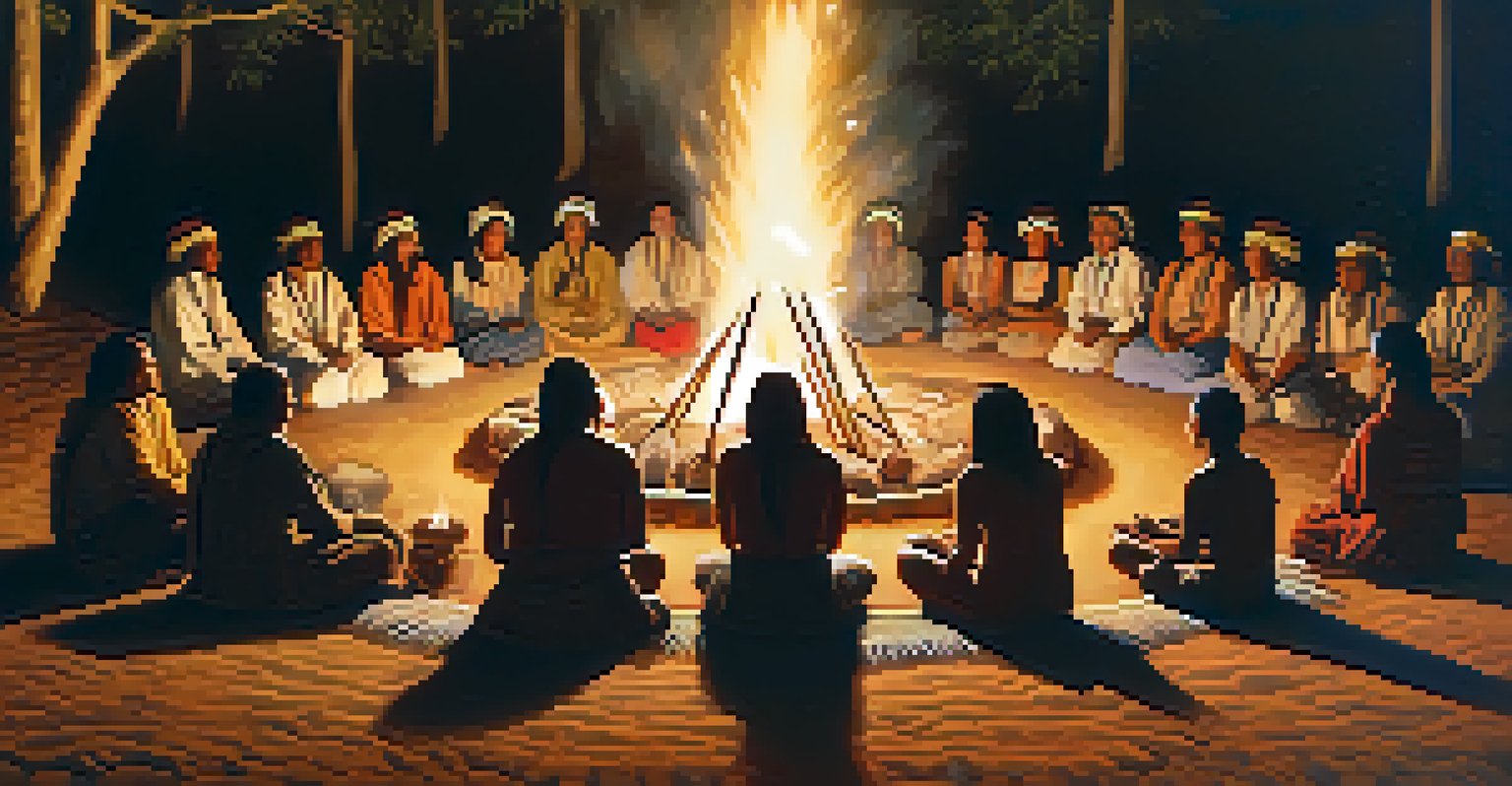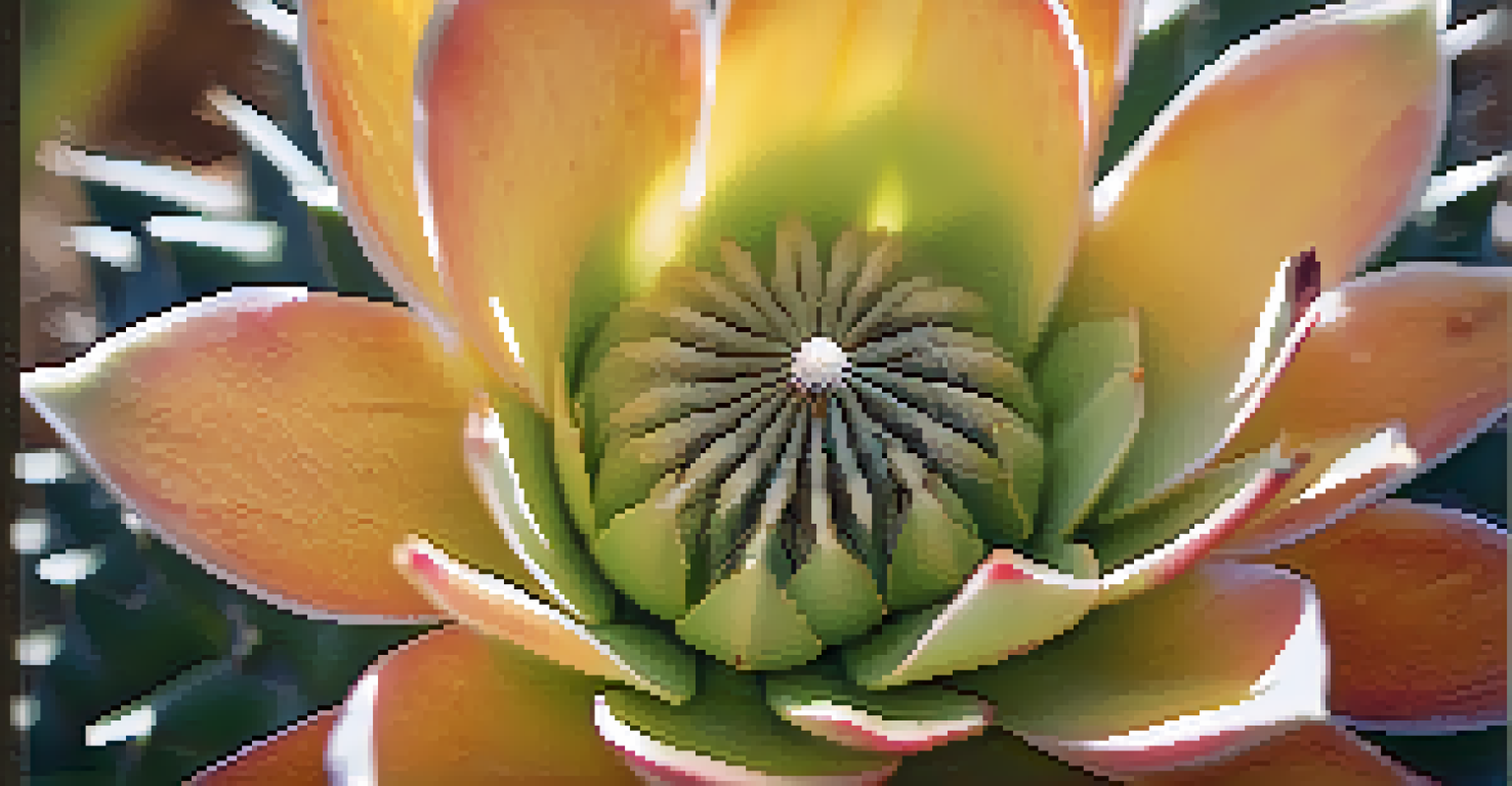Peyote Use and Preservation of Indigenous Identity

Understanding the Role of Peyote in Indigenous Cultures
Peyote, a small cactus native to the southwestern United States and Mexico, holds significant spiritual importance for many Indigenous communities. It is often used in ceremonial practices, where its psychoactive properties are believed to facilitate deep connections to the spiritual realm. This connection is essential for the expression of cultural beliefs and traditions that have been passed down through generations.
Peyote is not just a plant; it's a sacred entity imbued with profound meaning.
For many tribes, peyote is not just a plant; it's a sacred entity imbued with profound meaning. Through its use, individuals often experience a sense of unity with their ancestors and the natural world. This relationship underscores the importance of peyote in maintaining and expressing Indigenous identity, as it serves as a bridge between the past and present.
Moreover, the ceremonies surrounding peyote use are community-focused, fostering a sense of belonging and shared purpose. As participants come together to engage in these rituals, they reinforce their cultural ties and collective identity, ensuring that their unique traditions continue to thrive in a rapidly changing world.
The Historical Context of Peyote Use
Peyote has been used by Indigenous peoples for thousands of years, with its history deeply intertwined with their cultural practices. Archeological evidence suggests that it has been a part of rituals and healing for centuries, long before European contact. This rich historical backdrop highlights the resilience of Indigenous cultures in the face of colonization and cultural suppression.

Throughout history, the use of peyote has often been met with misunderstanding and stigma, particularly from non-Indigenous societies. Despite this, Indigenous people have fought to preserve their right to practice their traditions, including peyote use, as a means of asserting their cultural sovereignty. This struggle reflects a broader narrative of Indigenous resilience and the ongoing fight for recognition and respect.
Peyote's Spiritual Significance
Peyote serves as a sacred entity for Indigenous communities, fostering spiritual connections and cultural identity.
Today, peyote remains a symbol of cultural identity for many Indigenous groups. Its continued use serves as a form of resistance against the erasure of Indigenous traditions, proving that cultural practices can endure even in the face of adversity. This enduring connection to peyote is a testament to the strength and vitality of Indigenous culture.
Legal Challenges Surrounding Peyote Use
In recent years, the legal status of peyote has become a contentious issue, particularly in the United States. While some laws have been enacted to protect the use of peyote in religious ceremonies, there remain significant challenges that Indigenous communities face. These include restrictions on harvesting the cactus and the growing concerns about its sustainability due to overharvesting.
Cultural practices can endure even in the face of adversity.
Indigenous groups have long advocated for their rights to use peyote as part of their religious practices. However, legal frameworks often overlook the cultural significance of peyote, prioritizing broader drug policies instead. This disconnect can lead to further marginalization of Indigenous voices and their cultural practices.
As legal battles continue, the necessity for advocacy and education grows. By raising awareness about the importance of peyote in Indigenous identity, communities hope to foster understanding and support for their rights. This ongoing dialogue is crucial to ensure that Indigenous traditions can be practiced freely and respectfully.
Peyote and Identity: A Source of Connection
For many Indigenous people, peyote use is more than a ritual; it is a fundamental aspect of their identity. The shared experiences during peyote ceremonies create bonds among participants, reinforcing their connection to one another and their cultural heritage. This communal aspect plays a vital role in preserving traditions and fostering a sense of belonging.
Psychoactive experiences induced by peyote often lead to profound insights and personal revelations. Participants frequently report feelings of interconnectedness, not only with their community but also with the universe. These experiences can reaffirm their sense of purpose and identity, which is especially important in a world that often marginalizes Indigenous perspectives.
Legal Challenges for Indigenous Rights
Indigenous groups face significant legal hurdles in preserving their right to use peyote, often overshadowed by broader drug policies.
Through the lens of peyote use, individuals can navigate their cultural identity in a contemporary context. It offers a space for healing, reflection, and reconnection with their roots, allowing them to assert their identity amidst modern challenges. This journey is vital for the survival and flourishing of Indigenous cultures.
The Importance of Sustainable Harvesting Practices
With the rising interest in peyote, sustainability has become a pressing concern for Indigenous communities. Overharvesting poses a significant threat to peyote populations, which are already limited in their natural habitats. As such, it’s crucial for both Indigenous and non-Indigenous peoples to advocate for sustainable harvesting practices that respect the plant's ecological balance.
Sustainable harvesting not only ensures the survival of peyote but also honors its sacred status within Indigenous cultures. Many tribes are working to establish guidelines that promote responsible collection methods, allowing peyote populations to regenerate while still meeting the needs of their communities. Education plays a key role in this effort, as awareness about the importance of sustainability can lead to greater respect for Indigenous practices.
By prioritizing sustainable practices, Indigenous communities can continue to use peyote in their spiritual ceremonies without compromising the health of their environment. This harmonious relationship between culture and nature is essential for the preservation of both the cactus and the cultural identities tied to it, ensuring that future generations can partake in these sacred traditions.
Cultural Revitalization Efforts and Peyote
As Indigenous communities face the challenges of modernity, many are turning to cultural revitalization efforts to strengthen their identities. Peyote ceremonies play a central role in these initiatives, providing a framework for individuals to reconnect with their heritage. These efforts are not only about preserving traditions but also about fostering pride and resilience among younger generations.
Through participation in peyote ceremonies, individuals often find a renewed sense of purpose and belonging. This revival of cultural practices encourages a deeper understanding of their history, language, and spirituality. As communities engage in these rituals, they also inspire one another to embrace their Indigenous identity with confidence.
Sustainability in Peyote Harvesting
Sustainable harvesting practices are crucial to protect peyote populations and honor its sacred status within Indigenous cultures.
Moreover, cultural revitalization is a collective endeavor that strengthens social ties within communities. As more people engage in peyote ceremonies, they reinforce the importance of these practices, ensuring that they remain vibrant and relevant. This interconnectedness fosters a sense of unity and purpose, essential for the survival of Indigenous cultures in today's world.
Looking Ahead: The Future of Peyote and Indigenous Identity
The future of peyote use and its role in Indigenous identity remains a topic of considerable exploration and discussion. As both legal and environmental challenges persist, it is essential for Indigenous voices to lead the conversations surrounding peyote's preservation. By advocating for their rights and sharing their experiences, they can influence policies that affect their cultural practices.
Additionally, increasing public interest in Indigenous issues offers an opportunity for greater understanding and support. By sharing stories and educating others about the significance of peyote, Indigenous communities can foster empathy and appreciation for their traditions. This outreach is crucial in creating allies who respect and support their cultural heritage.

Ultimately, the journey of peyote and its place in Indigenous identity is one of resilience and adaptation. As communities navigate the complexities of modern life, the sacred use of peyote continues to be a beacon of hope and connection. By embracing their heritage and advocating for their rights, Indigenous peoples can ensure that the traditions surrounding peyote endure for generations to come.